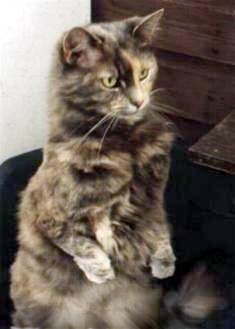Squitten
Squitten is a term used to describe a cat with physical anomalies that resemble those of a squirrel, particularly in the structure and appearance of its forelegs and tail. The name "squitten" is a portmanteau of "squirrel" and "kitten". These anomalies are often the result of genetic mutations or congenital conditions affecting the cat's development.
Characteristics[edit | edit source]
Squittens are characterized by their unusual physical traits, which can include shortened forelegs, a tendency to sit in an upright position similar to that of a squirrel, and a bushy tail. Some squittens may also exhibit a hopping motion when they move, rather than the typical feline gait. These characteristics can vary in severity from one individual to another and may affect the cat's mobility and overall quality of life.
Causes[edit | edit source]
The peculiar traits of squittens are typically the result of genetic mutations. One such condition is feline radial hypoplasia, a congenital anomaly where the bones in the forelegs are underdeveloped. This condition can cause the forelegs to be significantly shorter than normal or bent in a way that makes normal movement difficult. It is important to note that not all cats with radial hypoplasia will exhibit the full range of squitten-like characteristics, and the term "squitten" is not a formal medical diagnosis but rather a colloquial description of their appearance.
Ethical Considerations[edit | edit source]
The breeding of cats specifically to promote physical anomalies such as those seen in squittens is a subject of ethical debate. Critics argue that deliberately breeding animals with conditions that can impair their quality of life is inhumane. Advocacy for responsible breeding practices emphasizes the health and well-being of the animals over aesthetic or novelty characteristics.
Care and Management[edit | edit source]
Cats with conditions like those seen in squittens may require special care and accommodations to lead a comfortable life. This can include modifications to their living environment to make it easier for them to move around, as well as regular veterinary check-ups to monitor their health and manage any complications arising from their condition. Owners of squittens should be prepared for the possibility of increased medical expenses and should commit to providing a supportive and accommodating home for these special needs animals.
Conclusion[edit | edit source]
While squittens may capture the public's interest due to their unique and endearing appearance, it is crucial to remember the importance of ethical breeding practices and the well-being of the animals themselves. Prospective owners should prioritize the health and happiness of their pets, ensuring they are prepared to meet the special needs of cats with these rare conditions.
| This article is a stub. You can help WikiMD by registering to expand it. |
Search WikiMD
Ad.Tired of being Overweight? Try W8MD's physician weight loss program.
Semaglutide (Ozempic / Wegovy and Tirzepatide (Mounjaro / Zepbound) available.
Advertise on WikiMD
|
WikiMD's Wellness Encyclopedia |
| Let Food Be Thy Medicine Medicine Thy Food - Hippocrates |
Translate this page: - East Asian
中文,
日本,
한국어,
South Asian
हिन्दी,
தமிழ்,
తెలుగు,
Urdu,
ಕನ್ನಡ,
Southeast Asian
Indonesian,
Vietnamese,
Thai,
မြန်မာဘာသာ,
বাংলা
European
español,
Deutsch,
français,
Greek,
português do Brasil,
polski,
română,
русский,
Nederlands,
norsk,
svenska,
suomi,
Italian
Middle Eastern & African
عربى,
Turkish,
Persian,
Hebrew,
Afrikaans,
isiZulu,
Kiswahili,
Other
Bulgarian,
Hungarian,
Czech,
Swedish,
മലയാളം,
मराठी,
ਪੰਜਾਬੀ,
ગુજરાતી,
Portuguese,
Ukrainian
Medical Disclaimer: WikiMD is not a substitute for professional medical advice. The information on WikiMD is provided as an information resource only, may be incorrect, outdated or misleading, and is not to be used or relied on for any diagnostic or treatment purposes. Please consult your health care provider before making any healthcare decisions or for guidance about a specific medical condition. WikiMD expressly disclaims responsibility, and shall have no liability, for any damages, loss, injury, or liability whatsoever suffered as a result of your reliance on the information contained in this site. By visiting this site you agree to the foregoing terms and conditions, which may from time to time be changed or supplemented by WikiMD. If you do not agree to the foregoing terms and conditions, you should not enter or use this site. See full disclaimer.
Credits:Most images are courtesy of Wikimedia commons, and templates, categories Wikipedia, licensed under CC BY SA or similar.
Contributors: Prab R. Tumpati, MD


